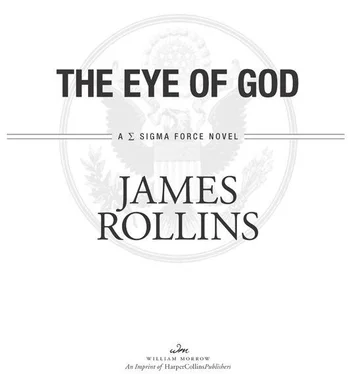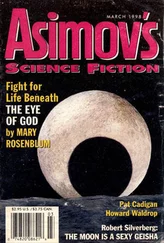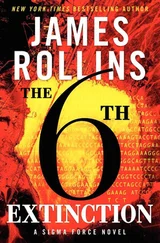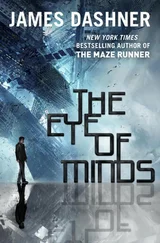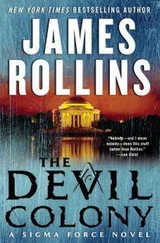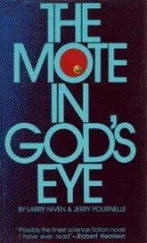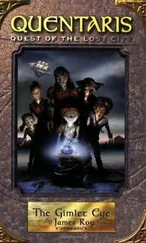Gray glanced over at Kowalski, who merely shrugged and picked up another slice of bacon.
“I think fit enough pretty much describes us,” Gray answered. “But a little more sleep en route, and we’ll be even better.”
“Good, then I wanted to show you this.” Painter turned to Kat.
She shifted into view, still tapping at the keyboard with one hand while staring at him. “I’m going to patch you in with Lieutenant Josh Leblang, out of McMurdo Station.”
“In Antarctica?”
“That’s correct. He’s with a recon crew about a hundred klicks out from the base, on the Ross Ice Shelf.” Kat punched a few more keys and spoke into a microphone by her chair. “Lieutenant Leblang, can you show us again what you found? Walk us through what you saw?”
A sputtering response reached Gray that sounded vaguely affirmative.
Then the screen cleared and was replaced with the face of a young man in a military parka. He had his hood thrown back, apparently enjoying the bright morning of an Antarctic summer. He wore a woolen cap over his short dark hair, his cheeks reddened from the cold, or maybe flushed from excitement.
From the shaky image, someone was filming him with a handheld camcorder. He spoke while walking backward up a ridge.
“About two hours ago, we saw five huge fireballs shoot over McMurdo. Thought it was a missile attack. The sonic booms—one after the other—had the entire base scrambling. My team was sent out to investigate. This is what we found.”
He reached the top of the ridge and stepped aside. The cameraman moved forward, the image jangling wildly. Once he stopped and steadied his hand, a hellish landscape came into clear focus.
Across the expanse ahead, massive craters pocked the blue ice, roiling with steam, blackened at the edges. Gray pictured the five meteorites punching through the ice and melting in the sea three hundred meters below. He spotted men, small black ants, moving on the ice, likely a part of Leblang’s crew. They offered perspective as to the huge size of those smoking pits.
Thunder rumbled over the speakers.
Gray didn’t understand the source of the noise—until a resounding series of thunderclaps followed. On the screens, cracks exploded across the snowy field, shattering ice high into the air. Fault lines burst jaggedly from crater to crater and splintered outward across the shelf.
Out of view, Leblang swore loudly. Then he appeared, running down the slope toward his endangered crew. The videographer dropped his camcorder and followed, too. The camera landed askew in the snow, still shooting, offering a crooked view of the chaos.
Fissures in the ice split wider, tearing apart the terrain below.
Men fled the destruction in all directions. Faint screams reached the camera’s microphone.
Gray spotted a pair of sailors falling away as the ice opened under them. An entire continent of ice slowly split away from the main shelf. Another crack skittered toward the camera and exploded before its lens, then the screen went black.
Kowalski, a former navy man himself, was on his feet, his fists clenched in frustration, unable to do anything.
Then Painter was back, red-faced and shocked, bent beside Kat, passing on orders. “—McMurdo Station. Raise the alarm. Tell them to get birds in the air ASAP.”
Gray waited silently as Painter and Kat sounded the alarm.
Once done, Painter finally returned his attention to Gray. “Now you understand what we might be facing.”
“What do you mean?”
“Shortly before Leblang reported from Antarctica, technicians and engineers over at the SMC in Los Angeles had confirmed their initial speculation that the destruction caught digitally by the crashing satellite was secondary to a cluster of meteor strikes along the East Coast.”
Gray pictured the devastation from a moment ago, imagining what would happen if those five meteors had hit a population center.
“The techs estimate that what impacted Antarctica were superbolide meteors, averaging seventeen to twenty meters across. They each struck with the energy equivalent of eight atomic bombs.”
Gray swallowed.
No wonder that shelf shattered into pieces.
Painter continued, “From analyzing the satellite image in great detail—taking into account the blast patterns, the depth of the impact craters, the degree of catastrophic destruction—they estimate that it would take meteors threefold larger than in Antarctica to cause that much damage.”
Gray went cold, picturing all his friends and family out there, including everyone at Sigma command.
“And it might not just be the East Coast,” Painter warned. “We have only this one snapshot. There is no way of telling if the destruction is more widespread, even global.”
“Or if it will happen at all,” Gray added, still skeptical. But after what he’d just witnessed, he was willing to err on the side of caution.
“That’s why we need that satellite recovered,” Painter said. “We have every eye looking skyward at the moment—Hubble, NASA’s Swift satellite, the UK Space Agency. We’re tracking a slew of rocks dragging in the wake of that comet, some as large as two hundred meters across. So far, according to all estimates, none of them are at risk of hitting the earth.”
“But what about the ones that just struck Antarctica?”
“That’s the problem. We can’t catch everything. It’s taken NASA fifteen years to track fewer than ten thousand asteroids in near-Earth orbit, meaning the vast majority go undetected. Take the Chelyabinsk meteor that exploded over Russia last year. It came as a total shocker. And if that meteor hadn’t exploded in the upper atmosphere, releasing a lot of its energy, it would have hit Russia with the force of twenty Hiroshima bombs.”
“So we can’t be sure of anything.”
Painter glanced to Kat, as if reluctant to say something.
“What?” Gray asked.
Kat nodded to Painter, who sighed loudly.
“There’s one last bit of disturbing news coming out of the SMC. It’s too early to draw any firm conclusions. But one of the physicists who was working closely with Dr. Jada Shaw has been analyzing her data on the initial gravitational anomalies in the comet, those same inconsistencies that Dr. Shaw believed proved the presence of dark energy.”
“And?”
“And the physicist at the SMC has been continuing to track those anomalies, as the comet comes closer to Earth. He’s convinced they’re growing larger .”
“What does that mean?”
Painter shot a glance toward Kat. “We’re still waiting for an answer to that very question. It could be significant . . . or it could be meaningless. We won’t know until more data is collected and analyzed.”
“How long will that take?”
“Half a day at the least, maybe longer.”
“So in the meantime, we find that satellite.”
“It may hold the answers to everything.” Painter stared hard at him. “How soon can you leave?”
“Now. If Kat can arrange the logistics—”
She shifted back in her seat. “I can get Commander Pierce’s team on the ground in Mongolia by daybreak.”
“What about Monk’s team?” Gray asked.
“I just heard word out of Kazakhstan,” Kat said. “A storm front will have them pinned down for a short time. But barring any other problems, they should be able to join you in Ulan Bator by midmorning.”
“Then let’s make that happen,” Painter said. “We need as many eyes on the ground out there as possible. Is Seichan willing to join you?”
On the way to this meeting, Gray had spotted Guan-yin heading down the hall, hiding the tears in her eyes. She was flying back to Hong Kong to assist those of her Triad who were still in harm’s way. From those tears, Gray could guess the answer to Painter’s question.
Читать дальше
